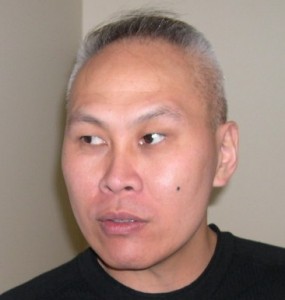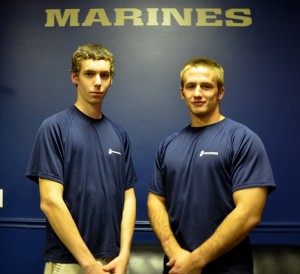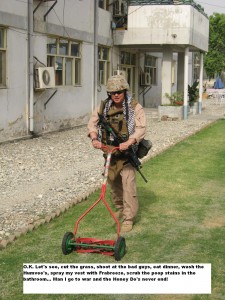The local war hero has vanished, having slipped out of Bucks County as quietly as the Delaware flows past his riverfront loft in Upper Black Eddy.
Behind him lie debts exceeding a half-million dollars, an unfinished McMansion on three acres, and a criminal inquiry into the deceit of Andrew Alexander Diabo.
In news stories, private conversations, and public documents, Diabo cast himself as a wounded Marine helicopter pilot who deployed repeatedly to Afghanistan and Iraq.
Visitors tell of having seen Marine dress blues and West Point cadet grays hanging in his apartment closet and, on a wall, framed Purple Heart and Silver Star certificates.
The Marines, however, never have counted Diabo, 38, among the few and the proud.
Marine investigators not only have debunked any tie to Diabo, but also say he used fake written orders to buttress his ruse, according to documents obtained by The Inquirer.
“If you say you are a Marine, by God you’d better be one,” said airline pilot Mitchell Bell, a lieutenant colonel in the Marine Corps Reserve who has doggedly sought to expose Diabo since learning of him in January.
Faux heroes infuriate veterans’ advocates, who clamor for tougher criminal sanctions and better military recordkeeping. Posers, they say, increasingly hamper true veterans seeking the benefits and respect they are due.
“You get so darn many phonies that the real deal becomes suspect,” said Doug Sterner, a decorated Army veteran lobbying for a public database of all military medals and honors awarded.
Last month, the Marine Corps Inspector General’s Office in Washington went after Diabo. On March 10, it sent a letter warning him to end the charade, and it referred the matter to federal prosecutors in Philadelphia, The Inquirer has learned.
“A review of Marine Corps current and former active duty, reserve, and retired personnel lists reveals that you have no affiliation with the United States Marine Corps,” the letter said.
Diabo disappeared days later.
Until then, Diabo’s claims of valor – taken on faith by journalists, friends, public officials, and even his own lawyer – had helped him deflect creditors, win public sympathy, and obtain free legal help. For years, his story had silenced residents upset with the weed-choked orphan that his unfinished “dream home,” begun in 2000 but not yet inhabitable, had become in nearby Tinicum Township.
That property – its owners more than $530,000 in hock to GMAC Mortgage – is up for a May 14 sheriff’s sale.
Which might be the least of Diabo’s concerns right now.
Federal law makes it a crime to impersonate a military official for personal gain or to falsely claim military honors. In late March, federal investigators drove up to the hills and hollows near Diabo’s apartment, flashing badges and asking questions.
But Diabo, his wife, Evelynn, and their 5-year-old son had cleared out, having told acquaintances they were leaving for his native Canada.
The U.S. Attorney’s Office in Philadelphia declined to comment Friday on the probe.
Diabo’s flight stunned all who had thought him legitimate.
“I don’t know what the truth is,” said Frank Caiola, a Norristown lawyer who handled Diabo’s foreclosure case for free. “This has been somewhat bizarre.”
“At this point I don’t know what to think. We’re curious, too,” said Diabo’s father-in-law, Bern Deichmann, a retired business executive in Northampton County.
Martin Focazio of Upper Black Eddy, whose family had befriended and tried to help the Diabos, said, “I feel like I’m a pawn in a jackass’ game.”
In the fall, he had lined up more than 100 volunteers eager to finish the heating, electrical, kitchen, and bathroom work still needed at Diabo’s house on Dark Hollow Road.
But when some pressed Diabo for even basic details of his military service, he demurred.
“We were going to have him in that house in no time,” Focazio said. “A lot of people said they would help him, and then he kept rebuffing them.”
The outpouring was in response to an article published Sept. 20 in the Intelligencer, a Doylestown newspaper. The article depicted Diabo as a wounded pilot who had spent “eight years fighting insurgents in Iraq,” only to come home to neighbors displeased with the state of his unfinished house.
It told of how Diabo had begun the house before heading off to Afghanistan – and then Iraq – after Sept. 11, 2001.
“We didn’t imagine that 9/11 would happen, and it’s been nine years of war, but here we are,” Diabo told the paper.
Neighbors, having held off for years in deference to Diabo’s supposed service, had by 2008 begun complaining openly to Tinicum officials. The house was a dangerous eyesore, they said, its overgrown grounds a magnet for snakes and vermin.
Readers were furious, calling the neighbors “snobs” and “creeps” and suggesting a volunteer effort to help.
Among those who stepped up was Paul Pfisterer, a Navy veteran in Upper Black Eddy, where the Diabos had rented an apartment for more than a decade. Pfisterer said he mowed the lot and met with Evelynn Diabo about the interior work still needed.
He started helping Focazio organize. Diabo, a computer-software expert, gratefully offered to repair Pfisterer’s PC.
When retrieving his computer from Diabo’s apartment, Pfisterer said, he saw the uniforms in the closet and the honor plaques on the wall. Diabo also showed him a Purple Heart medal that had been sitting on a small shelf.
“He had me convinced,” Pfisterer said.
Focazio, a digital-media strategist, also had seen the “war room.”
Tinicum Township’s file on Diabo’s house shows that the zoning and building permits were expired, but no one was pressing the vet.
A Sept. 3 e-mail from the township’s attorney to other Tinicum officials said that Diabo’s lawyer had described him as a West Point graduate and a Marine long away at war.
“Because of his particular skills (undefined), he served four tours of duty in Iraq and Afghanistan which prevented him from completing the home,” the e-mail said. “He was wounded while serving overseas and spent several months recuperating.”
On Nov. 9, the Intelligencer published a follow-up report that Diabo was cheered by all the support.
“Dozens of phone calls and e-mails poured in to the newspaper from readers who wanted to help . . .,” the story said. “Intelligencer readers wanted to do their part to honor the Marine’s sacrifice for his country.”
Diabo told the paper he “would do it all over again,” but made no mention of having spurned the well-wishers.
Patricia S. Walker, the Intelligencer’s executive editor, said the newspaper intended to publish a story this week about Diabo’s deceptions.
“It’s not the first time that we have been the victim of someone’s lies,” Walker said. “When we, and the community, are victims of someone’s dishonesty, we will report on that.”
At least one contractor stayed in touch with Evelynn Diabo through November, working on plans to complete the house. That fell through after the contractor, who asked that his name not be published, could not get her to identify Diabo’s military unit.
Suspicious, a relative of that contractor e-mailed The Inquirer, asking whether Diabo’s story could be verified.
A check of public records quickly raised red flags.
For one, it appeared Diabo was not a U.S. citizen. His marriage records listed a Canadian birthplace. A 2005 federal tax lien was filed against Diabo under an identification number typically used for aliens ineligible for a Social Security number.
In Diabo’s Bucks County foreclosure case, opened in 2006, lenders repeatedly filed statements based on military-service background checks that he was “not in the military or naval service of the United States or its allies.”
West Point officials had no record of Diabo. A Marine Corps records check came up empty as well.
An Inquirer reporter confronted Diabo in a Jan. 20 telephone interview.
Diabo acknowledged not having a Social Security number, but said he was here legally.
He insisted that his story was true but added a twist that would prove nearly impossible to confirm.
Because of the sensitive nature of his duty, he said, he had worked overseas under a pseudonym.
“I am Andrew Diabo. The military knows me as something else, but I can’t disclose that,” he said.
Publishing that information – or anything else about his background, he said – would endanger him and his family.
“You are going to put my family in jeopardy,” he said, refusing to elaborate.
Asked why he had attracted attention by speaking to the Intelligencer, Diabo said he felt forced to respond to complaints about his house but never gave permission to publish information about his military exploits.
Diabo said his lawyer, Caiola, could back up his story, as could Ralph Palatucci, a friend and former Marine captain who had known him for two decades.
In an interview the next day, Caiola said that there was “no question” about Diabo’s service, and that he apparently had been in deep cover. “My understanding was that he was in an operation so top secret that there might not be a public record of it.”
Contacted at his home in South Jersey, Palatucci said he had met Diabo while working at Merck, the pharmaceutical giant, in the early 1990s. Diabo had been a consultant for a Merck vendor in Montreal, Palatucci said, when he introduced Diabo to his future wife, Evelynn, a coworker at Merck at the time.
“He’s for real,” Palatucci said. He added that he had lent Diabo $10,000 to help stave off foreclosure and had enlisted Caiola, an old friend, to donate his legal services. Much of Diabo’s overseas work, he said, “was intelligence and secret-agent stuff.”
The Inquirer spent weeks trying to prove or disprove Diabo’s story through federal sources.
Enter Lt. Col. Mitchell Bell, an Iraq veteran in Texas who had gotten wind of the questions surrounding Diabo.
“I have a real distaste for anybody who hasn’t been there and claims they have,” he said. “That ruins it for the real vet who is truly in need.”
Bell, an American Airlines pilot who has led volunteer efforts to help Marines returning from duty, began working his contacts.
He found no trace of Diabo in military records. Or in a database of wounded Marines.
But then Bell turned up a copy of military orders that Diabo had allegedly been using to prop up his story. Dated March 4, 2007, the papers list a Social Security number for Diabo and give details of his purported transfer from Pearl Harbor to an Air Force base in the Netherlands two weeks later.
(A search of public databases indicates the Social Security number had belonged to a woman in Toledo, Ohio, who died in 1982 at age 89.)
The document was turned over to military investigators, who formally concluded in March that it – and Diabo the Marine – were fakes.
Bell then forwarded his findings to Palatucci, Diabo’s mentor and friend in South Jersey, who was floored. In a recent interview, Palatucci said he had questioned Diabo about it in early March.
“He said he couldn’t talk about it on an open line,” Palatucci said, “but that there was an explanation that he couldn’t say because his family would be in danger.”
Palatucci said he urged Diabo to contact Caiola and explain himself.
Instead, he said, Diabo took off.
“I still have this hope that he’s some kind of covert, secret-agent contractor for the government,” Palatucci said. “He owes me money, and I don’t know where he is.”
Martin Focazio’s last memory of Diabo is of a happy, Friday-night dinner their families shared Jan. 22 at Tooze, a restaurant in Milford, N.J.
That was just two nights after Diabo had begged The Inquirer not to blow his cover, yet at the restaurant he was boisterously playing the hero in public, Focazio’s wife, Paula, recalled last week.
“Andrew started telling people, ‘You know that house? That’s me,’ ” she said.
“And people said, ‘Oh, you’re the Marine! Thank you so much for serving our country!’ All the tables were sharing wine, and he was telling stories, and it was a fabulous evening at the time.
“Now I look back,” she said, “and it was all a farce.”
Contact staff writer Larry King at 215-345-0446 or lking@phillynews.com.



 “I have sat back and assessed the incident with the video of our Marines urinating on Taliban corpses. I do not recall any self-righteous indignation when our Delta snipers Shugart and Gordon had their bodies dragged through Mogadishu. Neither do I recall media outrage and condemnation of our Blackwater security contractors being killed, their bodies burned, and hung from a bridge in Fallujah.
“I have sat back and assessed the incident with the video of our Marines urinating on Taliban corpses. I do not recall any self-righteous indignation when our Delta snipers Shugart and Gordon had their bodies dragged through Mogadishu. Neither do I recall media outrage and condemnation of our Blackwater security contractors being killed, their bodies burned, and hung from a bridge in Fallujah.








